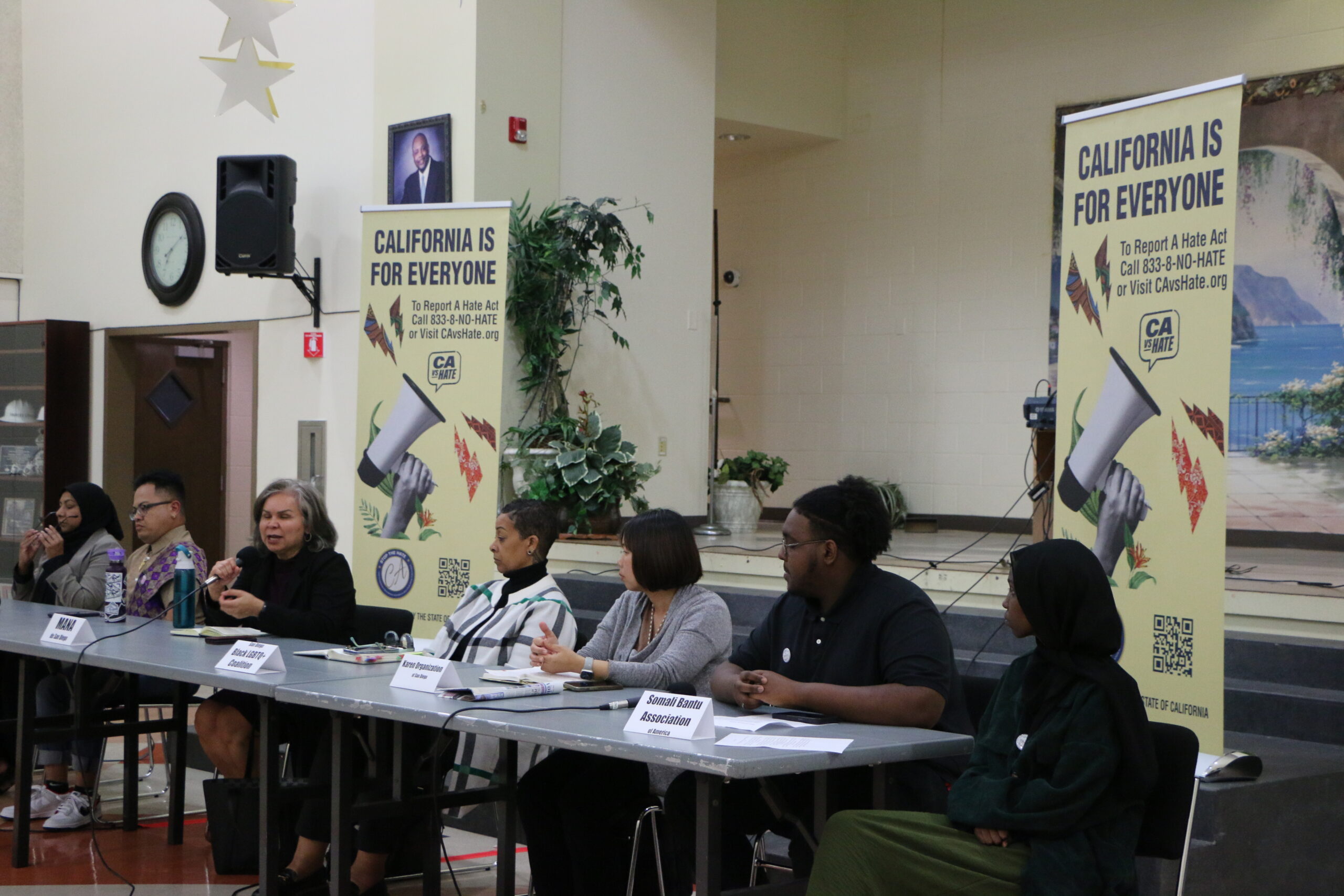
By Emily Kim Jenkins, Contributing Writer
The phrase “E Pluribus Unum” is engraved on American currency and is traditionally a motto of the United States. It means “from many, one”. Dr. John Warren, publisher of the San Diego Voice & Viewpoint, made a note of this symbol of unity through diversity when greeting the audience at Voice & Viewpoint’s “Hate & Our Communities of Color” Town Hall.
On April 18 at the George Stevens Senior Resource Center, members of the San Diego community joined the Voice & Viewpoint to discuss how hate affects our communities of color. As the audience poured in, Dr. Warren began by defining hate crimes vs. hate incidents, drawing on his background in law. He also mentioned that, at times, it can be difficult to identify hate depending on the background of the person(s) involved. Then, he opened up the floor for the public to share.
Whether they were representing different offices in city governments or students at a local school, voices from every corner of San Diego shared stories, questions and concerns– with a particular focus on unique qualities of hate experienced by different groups.
Joseph Ruanto-Ramirez of the API Coalition noted that, as the dust begins to settle from the pandemic, many in the Asian-American community are reluctant to discuss mental health in their daily lives. He also mentioned that the highest suicide rates for people of color between 2000 and 2010 were found among southeast Asian women.

Samir Abdirizak of the Somali-Bantu Association described harrowing incidents of Muslim women’s hijabs being torn off and of student athletes being discouraged from joining school athletics because they were “[their] type of people don’t work hard enough.” Dr. Inez Gonzalez-Perezchica from MANA de San Diego mentioned hate speech and how we speak, highlighting the fact that the term “illegal alien” dehumanizes undocumented immigrants.
“Language does matter,” Gonzalez-Perezchica said to dozens of emphatic nods in the audience.
A picture of unity in an otherwise oft-divided American society, members of different communities were able to ask questions and share stories of incidents where they had been confronted with acts of hate. Representatives from the Council on American Islamic Relations (CAIR), San Diego Asian Pacific Islander Coalition, MANA de San Diego, San Diego Black Pride, the Karen Organization of San Diego and the Somali Bantu Association of America were seated at the front of the room with more organizations and communities represented in the audience, including
One topic that quickly arose: issues students are facing across K-12 and college campuses.
Tazheen Nizam of CAIR cited a recent report which detailed an uptick in anti-Islamic hate incidents and said the local office has seen a 300 percent increase in reports, many of them from students facing pressures to not publicly show support for Palestine amidst the war. She also described a 2021 incident at Coronado High School when a visiting Escondido basketball team had tortillas thrown at them. Queer students can face additional risks of housing and food security, Angelle Maua of San Diego Black Pride also noted, if outed to parents by teachers or school administration.
“There is so much of that in our systems, in our schools,” Nizam said. “Until we all come to the table in forums like these and have diverse communities, we can’t have true, honest dialogue about this and heal.”
Behind the panelists stood two yellow banners with the words “California is for everyone” sprawled across the top and the phone number 833-8-NO-HATE visible for all to make note of.
Tuyen Nguyen, Stop the Hate Program Director for Catalyst San Diego/Imperial Valley, shared more about the number posted on the banners behind the panel. Created by CA vs. Hate, the hotline has interpreters for over 200 languages and was “meant to create an alternative to law enforcement,” Nguyen said.
She said callers do not need to be afraid of calling if they are unsure if what they have experienced was a hate incident, nor should documentation or immigration status prevent them from calling. After discussing the experience with a representative, if it is deemed a hate crime or incident, the caller then can choose if they would like to report it to law enforcement or not.
Attendees shared an enriching discussion of understanding and identifying some of the main hate-related problems facing different communities, as well as discussing the broad diversity within specific communities.
“There are many definitions of ‘safe,’” Nao Kabashima, Executive Director of the Karen Organization, which services the Burmese community, said, “and every single person should feel safe somewhere.”
The next Voice & Viewpoint Town Hall will also focus on hate, looking towards solutions. It will be on May 23, from 6 to 8 p.m. at the Southeastern Live Well Center.
This resource is supported in whole or in part by funding provided by the State of California, administered by the California State Library in partnership with the California Department of Social Services and the California Commission on Asian and Pacific Islander American Affairs as part of the Stop the Hate program. To report a hate incident or hate crime and get support, go to CA vs Hate.

